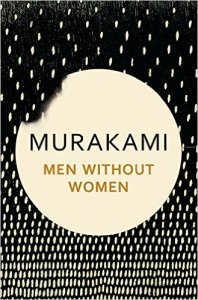 ‘Men Without Women’ by Haruki Murakami is the renowned Japanese author’s first new collection of short stories to be translated into English in over a decade. Echoing Ernest Hemingway’s collection of the same name, the seven tales in this collection are indeed about men experiencing loneliness and isolation without the women who are now absent from their lives for various reasons. The stories have been translated by Ted Goossen and Philip Gabriel who have both worked on many of Murakami’s previous books.
‘Men Without Women’ by Haruki Murakami is the renowned Japanese author’s first new collection of short stories to be translated into English in over a decade. Echoing Ernest Hemingway’s collection of the same name, the seven tales in this collection are indeed about men experiencing loneliness and isolation without the women who are now absent from their lives for various reasons. The stories have been translated by Ted Goossen and Philip Gabriel who have both worked on many of Murakami’s previous books.
The opening story and one of the strongest in the collection is ‘Drive My Car’ which is about a middle-aged widowed actor who employs a female chauffeur to drive him to theatres after a minor accident caused by a blind spot. Continuing the theme of titles taken from Beatles songs, ‘Yesterday’ sees the narrator reflect on friendships during his university years. ‘An Independent Organ’ is about a plastic surgeon who falls in love with a married woman and wastes away when he discovers she has had other affairs.
While this collection leans more towards realism overall, the most surreal and perplexing story reminiscent of Murakami’s earlier work is ‘Samsa in Love’ – it made a bit more sense when I found out afterwards that it is a reversal of Franz Kafka’s ‘The Metamorphosis’ in which an insect turns into a man and has to adapt to living in a human body. The title story is a similarly abstract account of a man who learns that his ex-girlfriend has committed suicide after receiving a phone call from her husband.
Having stuck to a specific set of themes and motifs throughout his career, many of Murakami’s trademarks once again make an appearance here including jazz bars and cats although slightly less prominently compared to some of his other work. From his epic novels to his shortest stories, Murakami’s work rarely offers any neat conclusions and the stories here are no exception but they are controlled enough to prevent them from becoming incoherent. The collection as a whole strikes a good balance between the eccentric weirdness of Murakami’s imagination and the more popular realist elements, making it an ideal place to start for newcomers to his work.
‘Men Without Women’ is a quiet, melancholic and measured collection of stories. It will satisfy Murakami’s legions of fans who currently have a long time to wait for his latest two-part novel ‘Killing Commendatore’ to be translated into English and may win him a few more in the meantime.





I’m glad this has been published, although I don’t think there’s an audio book for my husband yet! Do bad things happen to the cats in this one? He has a habit of doing that …
LikeLiked by 1 person
Nothing too traumatic…I’m not sure about the audiobook but hope you can get hold of a copy!
LikeLiked by 1 person
Really should give Murakami a go. Sounds very interesting. Great review!
LikeLike
Thanks!
LikeLike
Lovely review. I have plans to read this real soon too. I am a bit disappointed that most of the stories in it are realistic. I am someone who enjoys Murakami’s surreal fiction more. Nevertheless I am eager to read it.
LikeLike
Thanks, hope you still enjoy it and that there’s enough surrealism to satisfy you!
LikeLiked by 1 person
This book is definitely on my to-read list! Nice review 🙂
LikeLike
Brilliant 🙂
LikeLike
I love Murakami, and was excited to know this book was out. Your review now gives me a nudge to pick up this book. 🙂
LikeLike
Great, hope you enjoy it!
LikeLiked by 1 person
Like your thoughts on the book – as for myself, coming to terms with loss was the single largest theme in the book.
LikeLike
Thanks!
LikeLike
Pingback: The Man Booker International Prize 2018 Longlist Predictions | A Little Blog of Books